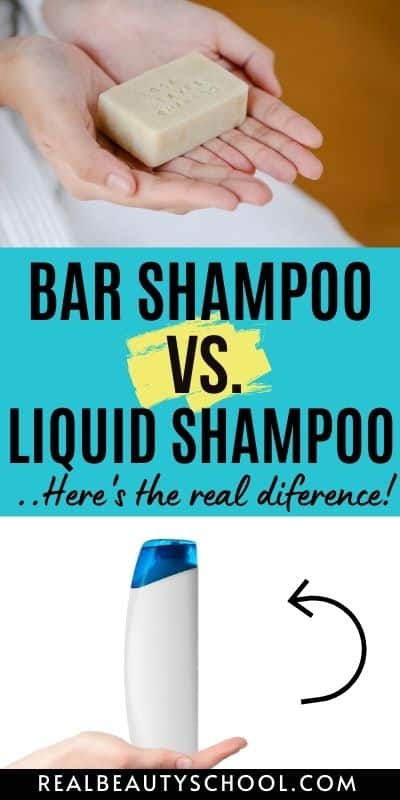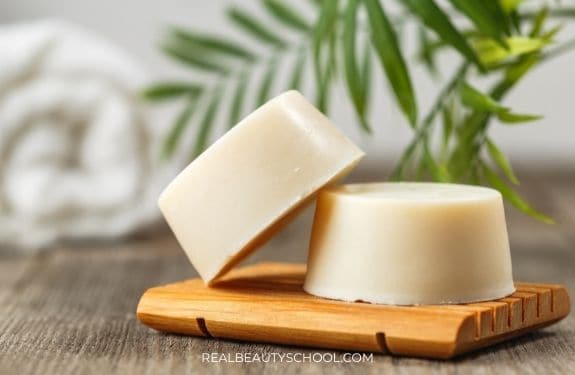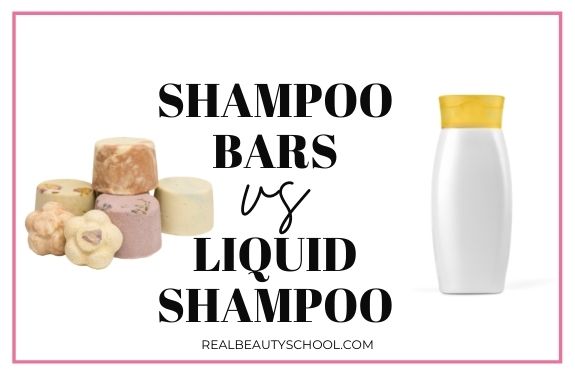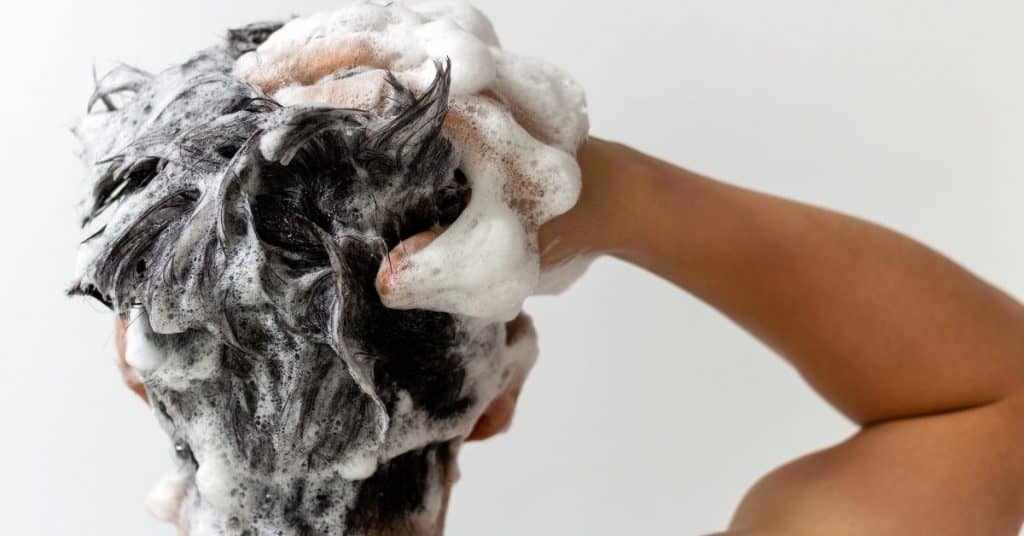Shampoo bars vs liquid shampoo. Everything you need to know!
We live in a time where we have to be increasingly conscious of the environmental effects of our choices and actions. Savvy consumers today are urging the beauty and skincare industries to do better by developing products that are sustainable and eco-friendly.
The now-growing popularity of bar shampoos over the traditional liquid shampoo demonstrates a readiness by customers to adapt to better practices and do their part to address the waste management problem plaguing the environment.
Bar shampoos have been around for a while, but there is a renewed interest and demand for them now, clearly fuelled by the increasing global adaptation of the zero-wastage movement.
In theory, everything sounds perfect. But it would be remiss of us to make any recommendations without getting down to the nitty-gritty of the matter!
Let us look at solid and liquid shampoos in detail to see if one is better than the other and whether you should take the plunge and jump on board with the trend.

This post may contain affiliate links. That means if you click and buy, I may receive a small commission (at zero cost to you). Please see my full disclosure policy for details.
Are bar shampoos better for your hair?
Bar shampoos are simply shampoos in a bar form. Solid shampoo bars clean your hair and scalp the same way that typical liquid shampoo does. To use it, you start by wetting the bar, lathering it between your hands (or rubbing it directly on your head), massaging it onto your scalp, and washing it off as usual.
Good shampoo bars are full of nutrients, essential oils, proteins, and other hair-replenishing ingredients. They are created from naturally derived components and are free of harsh chemicals. They come in many kinds to suit diverse hair types and textures.
Going by the glowing reviews of long-time users, the shampoo bar, while being an excellent cleanser, also hydrates your hair, leaving it soft and silky, all while using eco-friendly ingredients. It can take some getting used to at first, but it works very well in removing years of product buildup and restores your hair to its former glory.
While liquid shampoos provide similar benefits, they typically use surfactants like Sodium Laureth Sulfate and its derivatives, which are harsher on hair. The detrimental effects of these additives are not fully understood, but they may cause long-term damage to your hair and health.
As a side note, while solid shampoo may resemble ordinary bath soap, it is not the same and should not be used interchangeably (unless otherwise stated). Skin and hair have different acidic levels. Body soap can disrupt the pH level of hair and make it weak and dry.
Good quality shampoo bars will have the appropriate pH levels that work for your hair. You may even be able to skip the conditioner, thereby saving a ton of time. They will also be devoid of synthetic fragrances and other irritants, allowing your hair to look its best in the long run!
Are shampoo bars better for the environment?

Going for a liquid or solid shampoo is a personal choice, but shampoo bars are undeniably the best option for the eco-conscious consumer.
So what makes bar shampoos the better alternative for the environment?
Better ingredients
Bar shampoos are created with natural and plant-based ingredients, essential oils, and other elements. They are biodegradable and also free of sulfates and parabens.
Eco-friendly packaging
Unlike liquid shampoos that come in bottles made of single-use plastic, bar
shampoos come in biodegradable or recyclable packaging.
More quantity
A single shampoo bar can last as long as three bottles of liquid shampoo. They are highly concentrated, and a little can go a long way. Lesser consumption means a reduced strain on the supply lines and a much smaller carbon footprint.
Reduced waste
More than 500 million shampoo bottles end up as garbage. Shampoo bars can end the frequent repurchasing of these bottles. Ultimately, much less waste ends up in landfills and oceans.
Conserves water
Shampoo bars thoroughly cleanse, moisturize, and rebalance natural hair oils, allowing you to go longer between washes. And unlike liquid shampoos, which are nearly 80% water, bar shampoos have a high concentration of ingredients and need very little water to be formed.
Are solid shampoos and hair conditioners as effective as liquid products?
Mostly, yes. High-quality bar shampoos and other solid hair products can be just as effective as liquid products, if not better. The added advantage of being ecologically sustainable makes them even more attractive.
What makes shampoos effective?
- They deliver powerful cleansing without being harsh on your hair.
- They have nourishing ingredients that are safe even for long-term use.
- They are formulated with balanced pH levels and humectants for healthy, moisturized hair.
These facts hold true for most shampoo bars, so you can rest assured that they will do a fine job of keeping your hair in its best shape.
The absence of chemical additives, SLES, sulfates, and parabens make them a better alternative to most liquid shampoos.
There is, however, a learning curve with shampoo bars. Some users say there is a transitional period when hair feels waxy and heavy, but these effects are usually temporary.
Curly and long-haired folks may notice more frizz and tangles created by the action of rubbing hair with the bar. This, however, can be addressed by making a lather with your hands and massaging the hair gently.
Another reason bar shampoo may not appeal to you is that it does not lather as well as liquid shampoos. The essential oils and natural ingredients in bar shampoos may be great for hair, but the lack of surfactants makes the washing process a chore.
Shampoo bars with plant-based surfactants are a possible alternative.
Let us take a look at the pros and cons list for both liquid and solid shampoos and understand which is the better choice.
bar shampoo: The pros
✅Pros:
- Natural ingredients make your hair soft and silky.
- Excellent cleansing power works without robbing hair of its natural oils.
- Plant-based and naturally derived ingredients ensure minimal damage to the ecosystem and water bodies.
- This long-lasting product is equivalent to three shampoo bottles, which leads to reduced consumption and a lower supply chain carbon footprint.
- They are well-suited for those with sensitive skin and hair
- Plastic is minimally used. The packaging is recyclable or biodegradable, resulting in very little waste generation.
- It is very easy to carry while traveling, even on flights.
- Bar shampoos are simple to store, with no spills, leaks, or mess.
- They require very little room and hence are great for decluttering storage spaces.
- You can make bar shampoo even at home!
bar shampoo: The Cons
⭕️Cons:
- There are no preservatives added, so they could spoil faster.
- Organic and natural bars made without surfactants are difficult to lather and make washing hair difficult. Hard water can make it even more challenging.
- Some bars give hair a waxy texture and make it feel heavier and more brittle.
- They should be stored away from water to prevent any disintegration.
- Rubbing directly onto hair can cause frizz and tangles if you are curly or long-haired.
- Not all shampoo bars are of the same quality. Some may contain harsh chemicals and be no different from traditional shampoos.
- Some bars can cause fading in color-treated hair.
Liquid Shampoo: The Pros
✅Pros:
- Liquid shampoos come with surfactants and are very efficient in cleaning hair and scalp.
- There are many varieties to choose from; moisturizing, color-protecting, volumizing, dandruff cleansing, and so on, depending on your needs.
- There are specialized shampoos for all hair types and textures
- There are natural and eco-friendly shampoos with organic and plant-based ingredients that can leave you with beautiful hair.
- They are formulated at the optimal pH level for hair.
- They have a good shelf life.
Liquid Shampoo: The Cons
- Many liquid shampoos contain harsher additives like sulfates, phthalates, and synthetic fragrances that can damage hair by making it dry and brittle. They are also considered detrimental to marine life.
- They are not the environmentally-conscious choice. More than 500 million shampoo bottles end up in landfills, and chemicals often leach into the water.
- Nearly 80% of liquid shampoo is water, so you use more product compared to bar shampoo. Frequent repurchases create a larger carbon footprint and increase consumption of single-use plastic and other packaging materials.
- The waxes and silicones in shampoo and conditioner can cause residue buildup in the hair and scalp, causing thinning and hair loss.
- They are not travel-friendly and are prone to spills and leakage.
- To offset the harsh effects of shampoo, other products like conditioner, serum, etc., must be used, making haircare a laborious multi-step process.
Best Bar shampoo

The shampoo bar market is gaining a lot of traction as the demand for sustainable alternatives grows. Bar shampoos can now be found everywhere, from small home-based businesses to major corporations.
Shampoo makers like Ethique offer more than 10 types of shampoo bars for different hair types. They have many fan-favorite varieties, loved for their great ingredients and their ability to clean hair diligently without any harsh after-effects.
These shampoos are, however, on the pricier side and have some surfactants added to them.

Another brand with quite a cult following is J.R.Ligget, a classic old-fashioned shampoo bar with plenty of nourishing agents.

For those with curly hair, Hibar has a great set that comes with both shampoo and conditioner bars.

If you want to begin small, Garnier’s “whole blend hydrating shampoo” is a good drugstore pick. They are affordable but do not skimp on quality ingredients.
The sheer number and variety of bar shampoos may be overwhelming, but with a little research and some trial and error runs, you can find the shampoo bar that is right for you.
Final thoughts on Bar shampoos vs liquid
We have discovered the many glorious benefits of using shampoo bars over their traditional liquid counterparts.
It is, however, worth noting that traditional shampoos have also joined the bandwagon by replacing several damaging elements and switching to sustainable solutions.
This isn’t to say shampoo bars are a one-size-fits-all solution. You may find it difficult to adjust to a solid shampoo, or you may feel that it falls short of your expectations.
The key is to find a well-made product that is tailored to your hair type and other lifestyle choices. With a little perseverance, you will certainly attain your hair goals!
All things considered, it may be safely said that solid shampoo bars are indeed the best choice for both you and the environment.
Comment below what you think, are you ready to switch to bar shampoos? I’d love to hear from you!
bye bye!
Valeria
What’s Next? Related Haircare Posts:
- How to Grow your hair with Natural Aloe Vera Hair Masks (7 DIYs!)
- The Exact 17 Secrets that made my hair GROW THICKER and HEALTHIER (even though my hair was super damaged!)
- 10 Impressive Hair Tips you can do at home Today!
- How to look Beautiful and Super Attractive in minutes! (25 proven ways)



